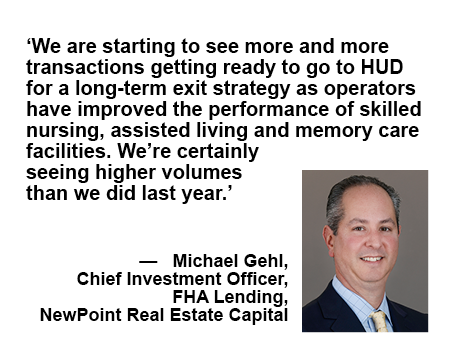It has been more than three years since COVID-19 lockdowns wreaked havoc on skilled nursing, assisted living and memory care facilities. Among other consequences, falling admissions and occupancies required many operators to seek or extend short-term loans to survive until brighter days.
The good news is that, to a certain extent, those days have arrived: Rebounding occupancies are inching closer to pre-pandemic levels, higher Medicaid reimbursements are flowing to net operating income, and labor costs are stabilizing, says Michael Gehl, chief investment officer for FHA lending for NewPoint Real Estate Capital.
As a result, an increasing number of creditworthy operators are applying for permanent loans guaranteed by the Department of Housing and Urban Development (HUD). By and large, HUD is still providing the same terms as before the pandemic, including leverage of up to 80 percent of a property’s value, terms of 30 or 35 years and no recourse, he adds.
“We are starting to see more and more transactions getting ready to go to HUD for a long-term exit strategy as operators have improved the performance of skilled nursing, assisted living and memory care facilities,” Gehl reports. “We’re certainly seeing higher volumes than we did last year.”
Caution at Banks

Sterling Senior Care
Still, new and old challenges alike continue to beset the residential healthcare space, says Nathan Jakobovits, CEO and co-founder of Sterling Senior Care, a Silver Spring, Md.-based operator of skilled nursing and assisted living facilities in the mid-Atlantic region.
Higher interest rates and heightened regulatory scrutiny of real estate lending have made banks more careful when originating bridge loans as well as less willing to negotiate terms with borrowers, he notes. Additionally, unlike in the recent past, today loan terms can change materially before a transaction closes.
“We’ve definitely seen a shift in the approach from banks — the lending environment is very different than it was a year or two ago,” Jakobovits observes. “As the term sheet moves up the ladder, it seems like the approach becomes more conservative as more people get their hands on it — even if the fundamentals of the asset remain the same.”

By contrast, during the months-long process that it takes to secure a HUD loan, the terms may not change, but the fundamentals easily could, he continues. Over that period, operators need to keep updating their trailing 12-month NOI, so maintaining performance remains paramount to ensure that they receive the full amount of loan proceeds requested and avoid added conditions.
To steer clear of those problems, operators need to work with a trusted lender who acts as a liaison to HUD, points out Jeffrey Kagan, president and co-founder of Sterling. “It’s a long process, and operators need to be very organized and diligent,” he adds. “HUD requires a lot of information, and you don’t want things slipping through the cracks.”
Labor Risk

Despite labor improvements — namely, the fact that skilled nursing operators are relying less on high-cost temporary staffing agencies than a year or two ago — labor disruptions in skilled nursing facilities remain one of the biggest risks during the HUD application and review period, states Erik Lindenauer, president of FHA lending for NewPoint.
Base salaries are already higher than they were before the healthcare labor crisis, thanks largely to inflation and a still-tight labor market. But if a situation arises that requires an operator to lean more heavily on the staffing agencies in the short term, expenses may increase by hundreds of thousands of dollars. That could materially lower NOI, which in turn could lead to a reduction in proceeds or even convince HUD to walk away from a deal.
Similarly, being placed on the Special Focus Facilities list by the Centers for Medicare & Medicaid Services due to poor inspection results could also endanger a HUD loan application, Lindenauer explains. More recently, he adds, HUD has signaled an aversion to borrowers with “headline risk,” such as operators that are involved in a high-profile lawsuit.
“There are a lot of things that can happen while operators are going through HUD’s underwriting process,” he says. “HUD just wants to make sure that it accounts for anything that could negatively impact a borrower’s credit.”
For operators that navigate the HUD loan process successfully, however, the rewards go beyond securing attractive long-term financing that stands alone in the market.
“It’s definitely a long, tedious process, but HUD is not overly intrusive,” Kagan says. “Sure, you have to comply with rules and submit financial statements in a timely manner, but once you get through the process, they’re pretty easy to work with, and they generally rely on us to make the proper operational decisions.”
— By Joe Gose. This article was written in conjunction with NewPoint Real Estate Capital, a content partner of Seniors Housing Business.
NewPoint Real Estate Capital is a prominent real estate finance company delivering lending solutions to investors of multifamily, affordable housing, seniors housing, healthcare and manufactured housing properties nationwide. Learn more at NewPoint.com.

